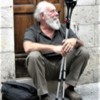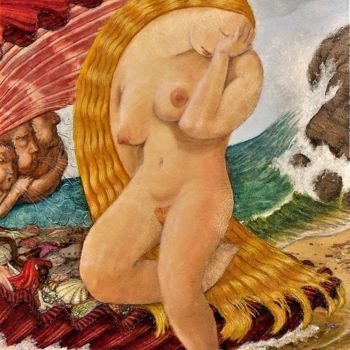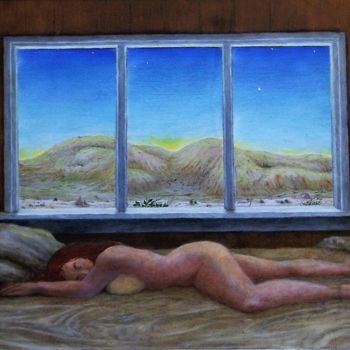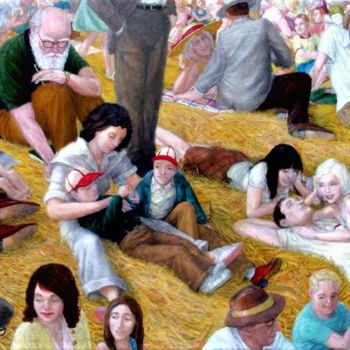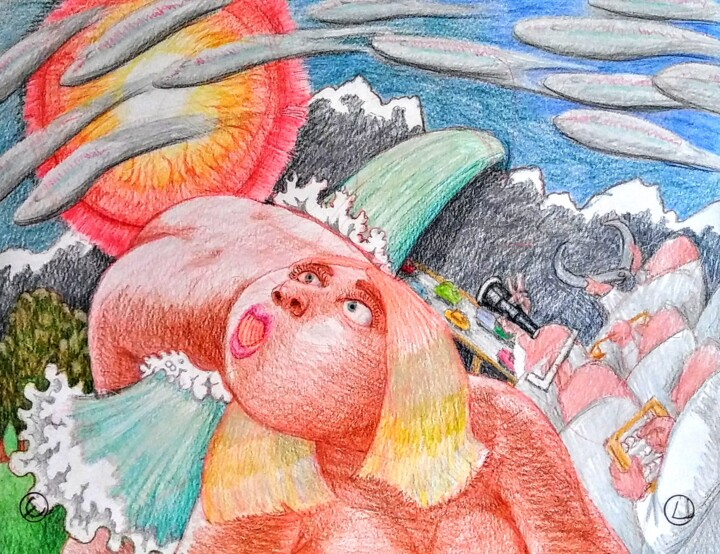


Lassen Sie uns wissen, wenn Sie mehr Fotos von diesem Kunstwerk sehen möchten!
- Rückseite der Arbeit / Seite der Arbeit
- Einzelheiten / Unterschrift / Oberfläche oder Textur des Kunstwerks
- Kunstwerk in Situation, Andere...
Scientists Study the Weather (2022) Zeichnungen von Edwin Loftus
Mehr Infos
- Verpackung (Briefumschlag) Alle Kunstwerke werden mit einem Premium-Carrier geliefert, sorgfältig geschützt und versichert.
- Kundendienst Auftragsverfolgung bis zur Zustellung des Pakets an den Käufer. Eine Tracking Nummer wird zur Verfügung gestellt, damit Sie das Paket in Echtzeit verfolgen können.
- Fristen Weltweite Lieferung in 3 bis 7 Tagen (Schätzen)
Mehr Infos
- Verfolgbares Online-Echtheitszertifikat Echtheitszertifikate können jederzeit online überprüft werden, indem der Code des Kunstwerks gescannt wird.
- Künstlerwert-Zertifizierung Experten untersuchen das Werk und den Werdegang eines Künstlers und ermitteln dann einen unabhängigen und zuverlässigen Durchschnittspreis. Der durchschnittliche Preiswert ordnet den Künstler in einer Preisspanne für einen bestimmten Zeitraum ein. Die Sachverständigen können auch gebeten werden, einen genaueren Schätzwert für ein bestimmtes Werk zu ermitteln.
Mehr Infos
100% sichere Zahlung mit SSL-Zertifikat + 3D Secure.
Mehr Infos
Dieser Druck ist in verschiedenen Grössen erhältlich.
Verkäufer Edwin Loftus
Dieses Bild steht zum Download mit einer Lizenz zur Verfügung
Verkäufer Edwin Loftus
-
Original-Kunstwerk (One Of A Kind)
Zeichnungen,
Pastell
auf Karton
- Masse Höhe 11in, Breite 14in
- Zustand des Kunstwerks Das Kunstwerk ist in einwandfreiem Zustand
- Rahmen Dieses Kunstwerk ist nicht gerahmt
- Kategorien Zeichnungen unter 5.000 $ Symbolismus Wissenschaft
To provide some context for understanding this:
- "Scientific method" is a collection of procedures by which we attempt to diminish distortions of perception caused by the subjective nature of perception. We attempt to impose objectivity on our subjectivity.
- Objectivity is purely aspirational, because, as Emmanuel Kant and others have argued, all perception is perception of the self. Therefore, all we assume to know about reality is actually just the perception of ourselves hypothetically responding to an existence beyond our ability to perceive.
- Science is based on the theory that there is an "objective" existence, independent of our subjective perceptions. Kant called these, "phenomena" and "noumena". For "science" to have value, there must be a noumena that is the source of the phenomena science studies.
This is significant because there is a competing theory also derived from Kant's (and other's) theories. It is, (in highly simplified form), that what is of value in the noumena, (objective reality), is not what it may have been, but what it is perceived as being. In this view, perception shapes reality in that reality is only known through perception. Whatever reality may be, what matters is what it is perceived as being. The implication of this being that what is real matters less than what is perceived as real.
This position recognizes that one can't simply declare something like gravity is not real and suddenly it will cease to be a factor. But perception actually lines up with a range of possibilities. Somewhere between this and that is what really is. We can't know what it is, but we can recognize that we don't know and think of it as this range of possibilities.
Or ... we can select somewhere in that range and push this assumption. Insofar as that potential is perceived as the most likely or most useful potential, it becomes "reality-insofar-as it is perceived."
This is how "science" becomes a tool of politics instead of a tool for the exploration of reality. If enough people can be convinced that "science" says reality is 'this' and not ' 'that' it qualifies those that see reality as 'this' and not 'that' as "more realistic" in their views and this gives the advocates and beneficiaries of 'this' an advantage over the advocates and beneficiaries of 'that'. And that advantage can translate into social power leading to reality as we experience being dominated by their views rather than those other's views.
Of course, "science" (or the appearance of science) has not been the only way assumptions about the nature of reality have been judged. "Science" as a discipline we teach and develop, is only about 500 years old. Prior to that, systems like "Holy Word", "Learned Opinion", "Established Wisdom", and "Personal Experience" were how one possibility was given significance over another possibility. Those earlier systems are still challenging science and "science" as alternatives today and have become targets of "science" or "pseudoscience" because they interfere with various people's ability to control what is predominantly accepted as possible.
In this image I used "Anthropogenic Global Warming" (changed to "Man-made Climate Change") as an example of this sort of effort. While scientific method has been used to produce some of the evidence used to support this theory, the theory is not a product of anything that could be called scientific method. I have portrayed this with a group of lab-coated men holding various measuring devices to try to study a subject, (Earth's Atmosphere) that is still very far beyond their ability to comprehend, and therefore to predict.
So, this is an image, not about the atmosphere or science, but about the latest of a series of efforts to support one idea about the best organization of societies over another idea.
The foundational issue from which these other issues arise is - Are average human beings of adult age best suited to manage their own lives and social interactions, are they better served by having more capable or better prepared people manage significant elements of their lives for them, or is there, and what is, the best compromise between these?
Verwandte Themen
Edwin Loftus ist ein amerikanischer Maler und Zeichner, der 1951 geboren wurde. Sein Interesse an Kunst begann im Alter von 4 Jahren, als er beschloss, etwas Reales zu zeichnen, anstatt nach seiner Vorstellung zu arbeiten.
Als Kind zeichnete er hervorragend und als Teenager begann er mit der Ölmalerei zu experimentieren. Am College belegte er Kurse in Kunst und Kunstgeschichte und erkannte, dass wahre Kunst nichts mit der Qualität der Zeichnung oder Malerei zu tun hat, sondern dass sie den Ehrgeiz haben muss, die Grenzen zu verschieben und das visuelle Erlebnis zu erweitern.
Er studierte auch Philosophie, Psychologie und Geschichte und erkannte schnell, dass es nur ein weiteres Kunstinstitut war, das versuchte, seine elitäre Industrie und sein Belohnungssystem zu verteidigen. Ihre Fähigkeiten waren fast nicht vorhanden, sie wussten nichts über Psychologie, Wahrnehmung oder Reizreaktion, und sie waren Erweiterungen des Glaubenssystems, das Kommunismus, Faschismus und andere Formen des Totalitarismus zu solch zerstörerischen Kräften in der Welt machte. Sie glauben buchstäblich, dass Kunst nicht für gewöhnliche Menschen zugänglich sein sollte, sondern nur für eine Elite, die „intellektuell“ genug ist, um sie zu verstehen.
Edwin Loftus erkannte, dass die Kaiser der Kunst keine Kleider hatten, aber sie waren immer noch die Kaiser. Begabt in der Kunst, arbeitete er hart, um diese Fähigkeit zu erwerben. Also fand er andere Möglichkeiten, seinen Lebensunterhalt zu verdienen und verkaufte von Zeit zu Zeit ein paar Kunstwerke. Sechzig Jahre lang erfreuten sich viele Menschen an seinen Werken und einige sammelten sie.
Heute ist Edwin Loftus im Ruhestand. Selbst wenn er alle seine Bilder für den geforderten Preis verkaufen würde, wäre "Künstler" der am schlechtesten bezahlte Job, den er je hatte ... aber so ist es nun mal. Nach seinem Tod ist es ihm egal. Er hofft nur, dass einige Leute das, was er tut, genug mögen werden, um es in Zukunft zu genießen.
-
Nationalität:
VEREINIGTE STAATEN

- Geburtsdatum : 1951
- Künstlerische Domänen: Werke von Künstlern mit zertifiziertem Künstlerwert,
- Gruppen: Zertifizierte Künstler Zeitgenössische Amerikanische Künstler



